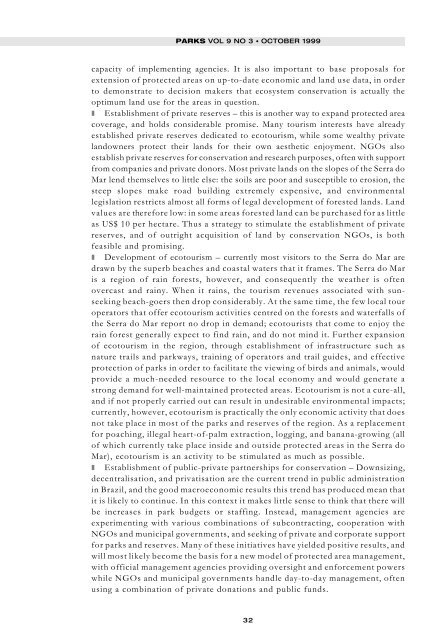Parks - IUCN
Parks - IUCN
Parks - IUCN
You also want an ePaper? Increase the reach of your titles
YUMPU automatically turns print PDFs into web optimized ePapers that Google loves.
PARKS VOL 9 NO 3 • OCTOBER 1999<br />
capacity of implementing agencies. It is also important to base proposals for<br />
extension of protected areas on up-to-date economic and land use data, in order<br />
to demonstrate to decision makers that ecosystem conservation is actually the<br />
optimum land use for the areas in question.<br />
❚ Establishment of private reserves – this is another way to expand protected area<br />
coverage, and holds considerable promise. Many tourism interests have already<br />
established private reserves dedicated to ecotourism, while some wealthy private<br />
landowners protect their lands for their own aesthetic enjoyment. NGOs also<br />
establish private reserves for conservation and research purposes, often with support<br />
from companies and private donors. Most private lands on the slopes of the Serra do<br />
Mar lend themselves to little else: the soils are poor and susceptible to erosion, the<br />
steep slopes make road building extremely expensive, and environmental<br />
legislation restricts almost all forms of legal development of forested lands. Land<br />
values are therefore low: in some areas forested land can be purchased for as little<br />
as US$ 10 per hectare. Thus a strategy to stimulate the establishment of private<br />
reserves, and of outright acquisition of land by conservation NGOs, is both<br />
feasible and promising.<br />
❚ Development of ecotourism – currently most visitors to the Serra do Mar are<br />
drawn by the superb beaches and coastal waters that it frames. The Serra do Mar<br />
is a region of rain forests, however, and consequently the weather is often<br />
overcast and rainy. When it rains, the tourism revenues associated with sunseeking<br />
beach-goers then drop considerably. At the same time, the few local tour<br />
operators that offer ecotourism activities centred on the forests and waterfalls of<br />
the Serra do Mar report no drop in demand; ecotourists that come to enjoy the<br />
rain forest generally expect to find rain, and do not mind it. Further expansion<br />
of ecotourism in the region, through establishment of infrastructure such as<br />
nature trails and parkways, training of operators and trail guides, and effective<br />
protection of parks in order to facilitate the viewing of birds and animals, would<br />
provide a much-needed resource to the local economy and would generate a<br />
strong demand for well-maintained protected areas. Ecotourism is not a cure-all,<br />
and if not properly carried out can result in undesirable environmental impacts;<br />
currently, however, ecotourism is practically the only economic activity that does<br />
not take place in most of the parks and reserves of the region. As a replacement<br />
for poaching, illegal heart-of-palm extraction, logging, and banana-growing (all<br />
of which currently take place inside and outside protected areas in the Serra do<br />
Mar), ecotourism is an activity to be stimulated as much as possible.<br />
❚ Establishment of public-private partnerships for conservation – Downsizing,<br />
decentralisation, and privatisation are the current trend in public administration<br />
in Brazil, and the good macroeconomic results this trend has produced mean that<br />
it is likely to continue. In this context it makes little sense to think that there will<br />
be increases in park budgets or staffing. Instead, management agencies are<br />
experimenting with various combinations of subcontracting, cooperation with<br />
NGOs and municipal governments, and seeking of private and corporate support<br />
for parks and reserves. Many of these initiatives have yielded positive results, and<br />
will most likely become the basis for a new model of protected area management,<br />
with official management agencies providing oversight and enforcement powers<br />
while NGOs and municipal governments handle day-to-day management, often<br />
using a combination of private donations and public funds.<br />
32

















